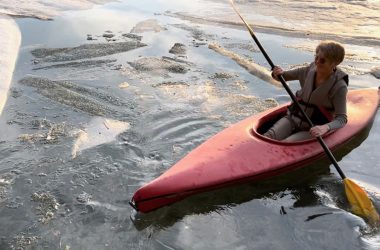
by Gazette Staff
GREENSBORO – At its May 10 regular meeting, the Greensboro Select Board discussed a petition to reduce the speed limit on Main Street in Greensboro Bend, water quality projects, and the initial planning for converting Town Hall into housing.
The first order of business was a petition with 31 signatures that was received by the town. The petition statement reads: “Shall the registered voters of Greensboro approve the lowering of the speed limit to 25 mph on Main St. in Greensboro Bend[?]” Jane Johns said almost all residents of Main St. signed the petition, and asked the board what happens next.
Board member Eric Hanson asked for some background on the petition. Johns said there has been an ongoing issue of speeding on Main St., adding that even 35 mph is too fast with so many kids and other pedestrians around. The problem could be compounded with the anticipated increase in traffic from rail trail users. Board member David Kelley made the following motion: “The Board will do everything it can to set a 25-mph speed limit on Main St. in Greensboro Bend, and will consult with the Orleans County Sheriff about legal and procedural issues.” The motion carried unanimously. Board chair Peter Romans said that he would contact the Orleans County Sheriff’s Department.
In the road foreman’s report, Tom Camarra said the road crew has been grading and is already applying chloride as needed. He also reported that Compton’s driveway on Cook Hill had extreme damage done to their driveway during the last, or second to last, plow of the season. Yards of gravel were scraped off down to the filter fabric; repairs required 40 yards of gravel at a cost of about $2,000. The driveway was plowed not with a pickup, but with a front-end loader equipped with a large plow. Romans discussed the damage with Jeff Perry, but he took no responsibility for the incident. While the driveway plowing contract states the contractor is not responsible for damage, Kelley said he would check the language closely. While the contract’s intent is to account for fair and reasonable damage, such extreme damage could be considered negligence. Kelley will draft a letter to Perry’s regarding the incident, to be reviewed by the board prior to sending.
Camarra reported that the town’s existing trailer, used primarily to move the excavator, is in poor condition and should be replaced. The board reviewed a quote for a new trailer, which Camarra noted is large enough to handle the front-end loader. Romans asked whether the quote reflects the unit the town actually needs, or is there a cheaper option? Camarra said this was the cheapest quote of the bids he received. There was discussion of how to pay for a new trailer, given that no funds are earmarked for it. The board voted to look into the issue.
Another topic for discussion was the Green-Up Day tires. The tire roll-off was overflowing after Green-Up weekend, and All Metals had to leave a pile of tires behind to move the box safely. There was discussion of what to do with the remaining tires. Town Treasurer Brett Stanciu will make some calls, but it appears that having the road crew haul them down to All Metals will be the simplest solution.
The town did not receive a grant for a gravel reclaimer this time around but will apply again next grant cycle. In the meantime, the town of Barton has agreed to rent their unit to Greensboro. The board reviewed the rental contract.
Also, at the 2022 Town Meeting, voters approved Article 5, which set the speed limit of “all gravel roads” at 35 mph. Board member Gary Circosta wondered about places in town where the speed limit has historically been lower than that, such as Country Club Road and up by the school. Given the way the article was written, he asked, can these areas legally have a speed limit less than 35 mph? During discussion, Romans said that since those areas have historically had lower speed limits, they can likely remain that way.
Next, Abraham Ames from the Orleans County Natural Resource Conservation District gave a presentation about possible water quality projects. He noted that there is very likely funding for these projects if the town chooses to move forward with them. After a Lake Wise assessment was done at the public beach, four restoration projects were identified. Ames said that he is seeking buy-in from all appropriate entities, and that he’d speak with the Hardwick Electric Dept. and the Beach Committee. The board endorsed pursuing the beach projects.
A second project involves Lauredon Ave., which a study identified as being the highest priority for stormwater improvements in Greensboro. Romans said that stormwater runoff in this area has been a problem for years and it would be fantastic if the state could improve the situation. A few years ago, he inquired about installing berms in the wet area across from the Village Green to slow down stormwater flows, but this was rejected by the state due to the field’s wetland status. Ames said that since the project would be considered watershed restoration, and since the study was commissioned by the Vermont Dept. of Environmental Conservation, berms would likely be approved this time around. During discussion, concerns were raised about potential impact on the community garden and the village green. Ames said that the project has not been fully designed and the town will have the final say on which approach is taken. The board approved moving ahead with the project planning.
The treasurer’s report was given by Brett Stanciu. The board reviewed the treasurer’s monthly report, the FY23 budget report, and the April check warrant reports. The board voted to move Cemetery Fund’s five-year CD, which is maturing soon, to an account with a higher interest rate. Stanciu told the board that the pay rate increases for FY24 need to be approved by the board.
The next topic for discussion was the project to convert Town Hall into housing. David Kelley met with Patrick Shattuck of RuralEdge and reported that all of the concerns raised at last month’s board meeting were easily addressed, including that there would be no assignment of the deed without the town’s consent, and due diligence will be done to study moving the town offices to the Grange. Kent Hansen said if that project is included in the overall feasibility study, it could increase the availability of grants.
Select Board Clerk Josh Karp asked whether, after RuralEdge completes the feasibility study at substantial cost to them and want to move forward, the town could choose to reject their proposal. The answer was that that the town can elect to not proceed. The board voted to start the process with RuralEdge and sign the option agreement.






